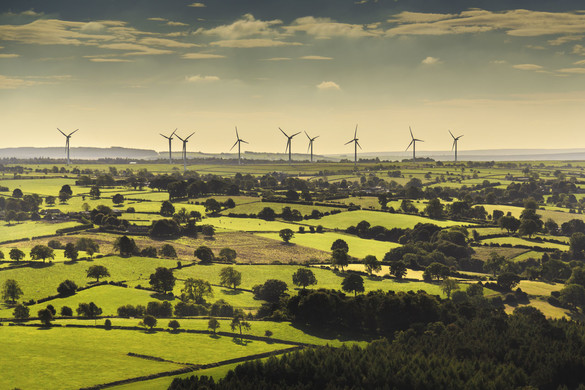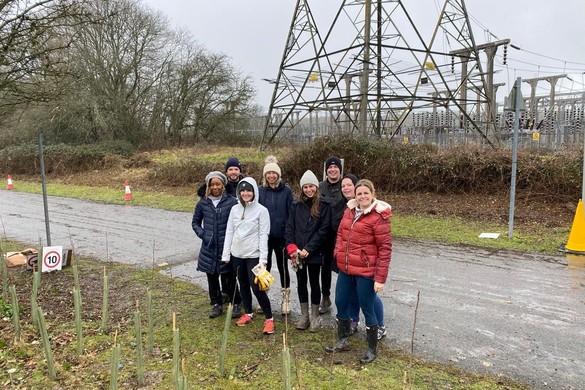
- Back
- Shareholder centre
- News
- Results & events
- Environmental, Social and Governance
- Resources
- Debt investors
- Feedback

As a responsible business and a Principal Partner of COP26, National Grid is committed to reducing its carbon footprint across all business activities. In March 2022, we progressed an initiative to encourage our shareholders to take advantage of electronic communications and 'go paperless’.
By signing up to our shareview portal, shareholders elected to receive information – including the Company's annual report and acounts, notices of general meetings and other shareholder circulars – electronically.

To thank shareholders for supporting us on our journey to net zero we made a donation to The Conservation Volunteers charity. The donation will support the planting of native trees across the UK.
Trees will be planted between November 2022 and March 2023. All trees planted in 2022, the Queen’s Jubilee year, will also be pledged towards The Queen’s Green Canopy initiative.
National Grid colleagues have been supporting The Conservation Volunteers by participating in the planting of trees during the year.

National Grid dividends are now chequeless. A bank mandate must be in place in order to receive your dividend payment. If you are a National Grid shareholder that receives a dividend cheque you MUST take action.
Further details about chequeless dividends can be found on Equiniti’s website here. FAQs are set out below.
The move to chequeless dividend payments is being made for reasons of efficiency and security as well as to reduce the volume of paper used in dividend mailings. National Grid, as a responsible business and a Principal Partner of COP26 is inviting shareholders to join us on our journey to Net Zero by reducing their impact on the environment through the use of paper. Please provide your UK bank or building society details for the account you wish future payments to be made via a mandate form.
Receiving your dividend via cheque will no longer be an option from 1 August 2022. Shareholders will need to complete and return a mandate form to Equiniti in the period leading up to 1 August 2022 to make sure they receive their dividend payment on the payment date. A bank mandate can also be set up over the phone or online via Shareview. Shareholders MUST take action.
Rather than having to wait for cheque to arrive in the post and then for it to clear in your account, you will now receive dividend funds directly into your account on the payment date, once a mandate form has been completed and returned to Equiniti.
Rather than having to wait for a cheque to arrive in the post, with the possibility of it not being delivered or to wait for the cheque to clear into your bank or building society account, direct credit is a method of payment whereby funds are paid directly to your nominated UK bank or building society account as cleared funds on the dividend payment date.
National Grid offers ordinary shareholders the facility to re-invest dividends, you can check Equiniti’s Re-invest Dividends section for further detail on the National Grid reinvestment option.
Important: reinvestment may not be offered for every dividend, to therefore ensure that any cash dividend can be sent to you on the payment date, please ensure you add you bank details to your holding
National Grid also offer a Scrip Dividend Scheme, further details can be found here.
If you do not provide this information, you will still receive an annual dividend statement. However, you will not receive the money until your bank details are received, after which payment will be credited to your account as soon as possible. Your dividends will not accrue interest while they are being held for you and there may be a fee for the release of payments.
Outstanding payments will be able to be re-issued to you, however, only direct to your bank or building society account. If you do happen to come across any dividend payment cheques that are out of date, you can return the cheque(s) to Equiniti with a mandate form and payments will be re-issued. Alternatively you can contact Equiniti, detailing the cheques you have found and they will get back to you. Please note that dependent on the value of the cheque(s) outstanding, there may be a fee for the re-issue of the payment(s).
Yes, you can provide a new mandate at any time. If you have a Shareview portfolio you can make the change online, you can complete a mandate form and return it to Equiniti by post, or you can contact Equiniti directly to update your details.
If you have a UK bank or building society account, you can provide those details to Equiniti in the same way. If you do not have a UK bank or building society account Equiniti offer an Overseas Payment Service It’s a service Equiniti can arrange in over 90 countries worldwide and it normally costs less than paying in a sterling cheque. The dividend will be credited to your account automatically - normally just a few days after National Grid’s dividend payment date. Visit Equiniti’s Overseas Payment Service for more details.
Removing cheques will have a major impact on National Grid’s paper impact as part of the dividend. We are also encouraging shareholders to go completely paperless, by signing up for a Shareview portfolio account and electing to receive all communications and statements electronically. Details on how to do this are below.
If you have a Shareview portfolio you can login and update your address online, you can download, complete and send a change of address form to Equiniti, or if you hold less than 2500 shares you can complete a contact form and Equiniti will get back to you.
You need a Shareview portfolio account to go completely paperless, once you have your account follow the below instructions.
We’re sorry to hear about the passing of the shareholder, you can notify Equiniti directly at the contact details here or you can view our dedicated bereavement section on Equiniti’s Shareview website bereavement section.